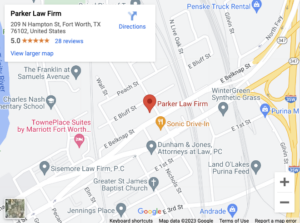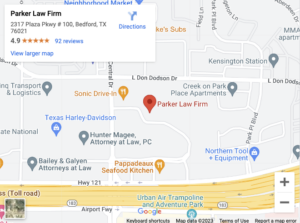Navigating Your Personal Injury Deposition: A Practical Guide

You get a letter in the mail. It’s a notice for your personal injury deposition. Suddenly, the legal process feels very real. You might imagine sitting in a conference room, facing an attorney who seems determined to catch you off guard. For many people who have already been through the stress of an injury, this is one of the most intimidating parts of the case. It can feel like you’re being put on trial, and it’s normal to worry about what will happen.
But it doesn’t have to be that way. With the right preparation, you can walk into your deposition feeling ready, not afraid. At Parker Law Firm, we make sure every client understands what to expect and how to handle it. When you know what’s coming and how to respond, you become the strongest advocate for your own case.
What is a Personal Injury Deposition and Why It Matters
Before we can demystify the process, we have to understand it. In the simplest terms, a personal injury deposition is a formal, sworn question-and-answer session conducted outside of a courtroom. You, as the plaintiff, will be questioned by the defense attorney representing the person or company you are suing. Everything you say is under oath, just as it would be in a trial. Sitting in the room with you will be your attorney, the opposing counsel, and a court reporter, whose job is to create a word-for-word transcript of the entire proceeding. This transcript is a permanent legal document.
It’s important to know why your deposition matters. The defense attorney is trying to do three things: get your version of the facts, make sure your story stays the same, and see how you come across as a person. If your answers change later, they’ll use that against you. How you handle your deposition can make a big difference in your case. A clear, honest performance can help you get a fair settlement. A poor one can hurt your chances. This is not just a conversation; it’s a key part of your case.
Deposition Preparation: Building the Foundation of Confidence
Confidence is not something you hope for on the day of your deposition; it’s something you build, piece by piece, in the weeks leading up to it. At Parker Law Firm, we see deposition preparation not as a rehearsal, but as the most critical phase of advocacy. This is where the transformation begins. We don’t believe in a one-size-fits-all approach, because every client and every case is unique. You don’t just show up confident on the day of your deposition. Confidence comes from preparation. At Parker Law Firm, we know every client and every case is different. We take the time to get to know you and your situation, because that’s the only way to prepare you properly. You’re not just a case number to us. Our memory on the specific details of your treatment, your pain, and how your injuries have impacted your daily life. Knowing these facts cold eliminates the hesitation that can be misinterpreted as dishonesty.
Next, we practice with mock depositions. We make it as real as possible, so you know what to expect. We don’t just ask questions we show you how to listen, take your time, and answer clearly and honestly. This is where you start to feel more comfortable and confident.
Answering Deposition Questions: The Rules of Engagement
Once you are in the deposition room, your conduct is as important as your answers. Your testimony is not just what you say, but how you say it. The key is to remain calm, composed, and in control. The defense attorney may be friendly or aggressive, but their goal is always the same. Your goal is to follow a few simple but powerful rules of engagement.
First and foremost, always tell the truth. This is the bedrock of your credibility. An inconsistency, even a small one, can be magnified and used to paint you as untrustworthy. If you don’t remember something, the correct and complete answer is, “I don’t remember.” If you don’t know something, the answer is, “I don’t know.” Never guess, never speculate, and never assume.
Second, always listen to the whole question before you answer. It’s easy to get nervous and want to answer quickly, but take your time. Only answer what was asked. Don’t add extra details. For example, if you’re asked, “Did you see the doctor on Tuesday?” just say “Yes.” Extra information can lead to more questions.
Finally, remember your attorney is there to protect you. We’ll be in the room with you, listening to every question. If a question isn’t right, we’ll object. If you need a break or don’t understand something, let us know. You don’t have to do this alone.
Navigating the Practical Concerns and Common Fears
We know you have practical questions as well. One we hear a lot is, “What should I wear to my deposition?” Dress like you would for a job interview or church. Business casual is best. You want to look serious and respectful. It’s not about fashion it’s about showing you take the process seriously.
Another common fear revolves around the duration. “How long does a personal injury deposition typically last?” While the duration can vary, most personal injury depositions typically last between one and three hours. We will ensure you are prepared for the duration and will request breaks as needed to keep you focused and comfortable. We also address the serious question: “What happens if I miss my deposition date?” Missing a deposition can have severe consequences, including potential dismissal of your case, so communicating any scheduling conflicts with your attorney well in advance is absolutely critical.
Finally, the issue of privacy arises. “Are depositions recorded, and who has access to them?” Yes, the deposition is recorded by a court reporter, who then creates the official transcript. In some cases, it may also be recorded on video. This recording becomes part of the official case record, and both your legal team and the opposing counsel will have access to it. This is why it is so vital to remember that you are always on the record, creating a permanent account of your testimony.
Unlocking the Opponent’s Playbook: Our Insider Advantage
This is where preparation with Parker Law Firm moves beyond standard tips and into a realm of true strategic advantage. Our approach is fundamentally different because our perspective is different. Lead attorney Brad Parker spent a significant portion of his early career as a defense attorney for insurance companies. He sat on the other side of that table. He knows their playbook because, in many ways, he helped write it. This dual-perspective advantage is not just a talking point; it is the cornerstone of how we empower our clients.
We don’t just teach you what to expect; we teach you why certain questions are being asked. We prepare you for the tactics designed to confuse or intimidate because we have seen them used thousands of times. For example, the defense attorney might ask a series of rapid-fire, yes-or-no questions. The purpose isn’t just to get information; it’s to get you into a rhythm of answering quickly without thinking, hoping you’ll make a mistake. We will train you to break that rhythm, to pause, and to treat every question with the same deliberate care and attention.
Or they might try feigning sympathy, acting like your best friend to lull you into a false sense of security, hoping you will let your guard down and volunteer damaging information. We prepare you to remain polite but professional, never forgetting that this is an adversarial process. We also prepare you for questions designed to provoke an emotional response, such as those about your past, finances, and family, all intended to see if you are easily angered or flustered, traits that can play poorly in front of a jury.
This is the moment of transformation. We observe it during our final preparation sessions. A client who came to us terrified of being tricked suddenly recognizes a tactical question for what it is. They see the trap before it’s even fully set. In a recent catastrophic injury case, the opposing counsel relentlessly attempted to portray our client as inconsistent, employing these very tactics. However, due to our thorough preparation, our client remained poised and calm. He listened, he paused, and he answered each question truthfully and concisely. He did not take the bait. That unshakable performance under pressure was a direct factor in the insurance company offering a substantial pre-trial settlement. He reclaimed his power by understanding theirs.
From the Most Terrifying Day to a Confident, Controlled Experience
The journey from receiving that dreaded notice to walking out of the deposition room with your head held high is profound. We see it time and time again. We recently had a client who was, by her own admission, consumed with anxiety about her deposition. She had trouble sleeping, picturing all the ways it could go wrong. We walked her through our entire process, including the document reviews, mock sessions, and the in-depth review of the defense’s playbook. We were candid about what was at stake, but we also armed her with the tools and knowledge to face it.
After her deposition was over, she told us that our preparation had “transformed what they expected to be ‘the most terrifying day’ into a ‘confident, controlled experience.'” That statement is the ultimate proof of our mission. It’s not just about securing a financial recovery; it’s about shouldering the emotional burden of the legal process for our clients. It’s about replacing fear with knowledge, anxiety with strategy, and vulnerability with empowerment. We fight tirelessly for you, not just in the courtroom, but in the conference room, ensuring you are never left to face the giants alone.
Your story matters. The truth of what you have endured deserves to be heard with clarity and conviction. A personal injury deposition is often the first and most critical stage for that story to be told. Don’t let it be a moment of fear. Let it be a moment of strength.
If you have been injured and are facing the daunting legal process ahead, you don’t have to do it alone. We’re here to listen, to understand, and to guide you toward a brighter future. Contact the Parker Law Firm today for a free, no-obligation consultation. Let us show you how we can help you take control of your story.


